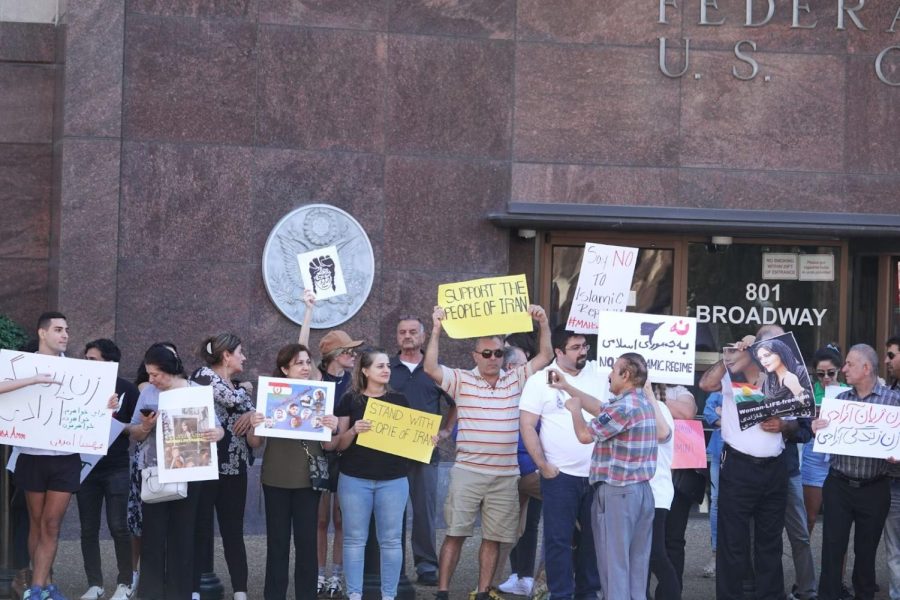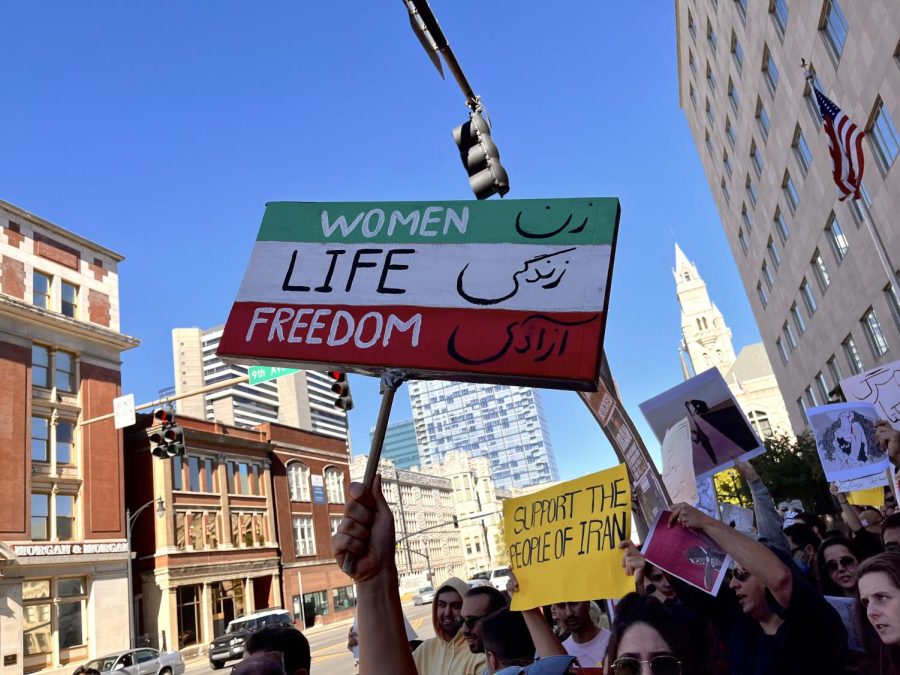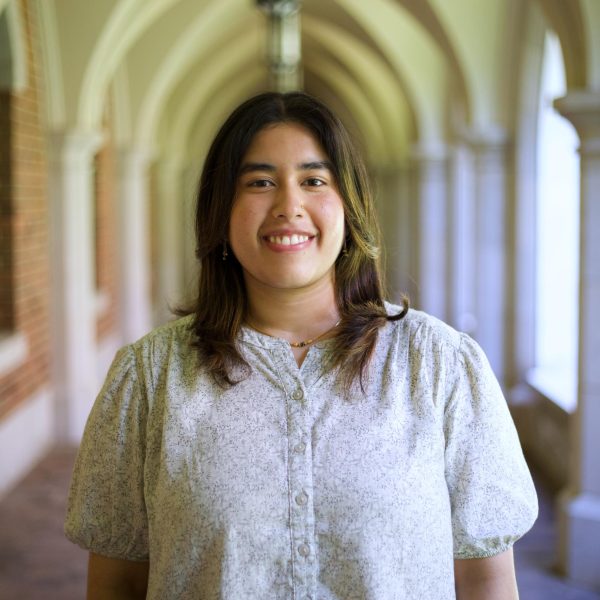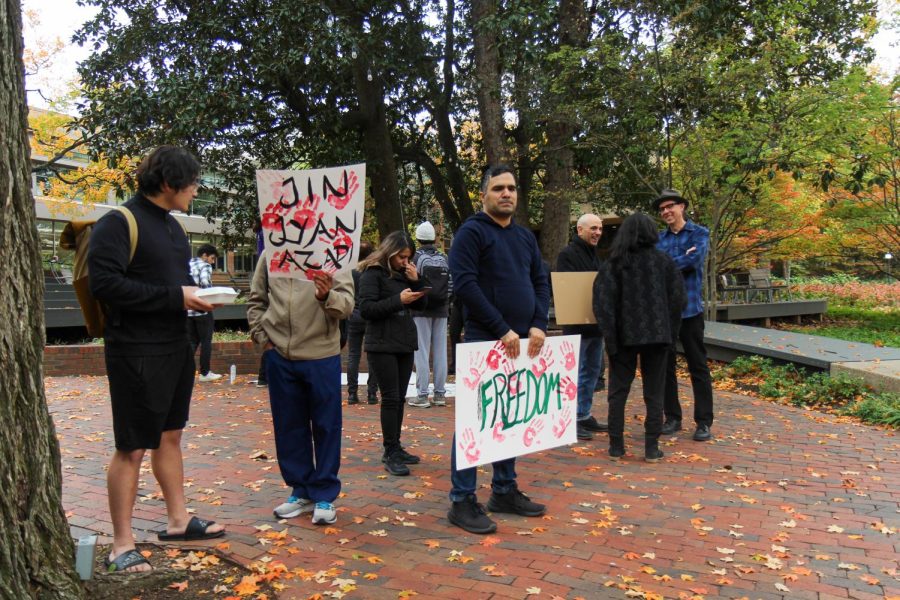Nearly 100 people, including Vanderbilt students, gathered outside the Estes Kefauver Federal Building in downtown Nashville on Oct. 1 to protest the killing of Mahsa Amini in Iran. Amini was arrested and beaten by Iranian morality police for allegedly violating Iran’s hijab law—which makes it mandatory to cover all of one’s hair—on Sept. 16. Amini was from Saqez, Iran, which has a majority Kurdish population. Nashville hosts the largest Kurdish population in the U.S., sometimes being referred to as “Little Kurdistan.”
The protest is part of a global movement dubbed the Freedom Rally for Iran, which called for cities around the world to hold rallies on Oct. 1. Protesters chanted and held posters displaying the slogan “Women, Life, Freedom,” in both English and Persian.
Junior Shayda Niksefat attended the rally and said this movement needs support on a global scale to help Iranians fight for what she believes are basic human rights.
“The death of Mahsa Amini was devastating and not the first time an event like this has occurred,” Niksefat said in a message to The Hustler. “We need to support the Iranians and give them a global voice.”
Many posters called for the removal of the Islamic theocracy in Iran, and protestors chanted “Down with dictators!” and “Shame on you Raisi! Shame on you Khamenei!” Ebrahim Raisi is the incumbent president of Iran, elected in June 2021, and Ali Khamenei is the Supreme Leader of the Islamic Regime, ruling since 1989.
The protesters demanded justice for Amini and asked Americans to “stand with Iranian people” in their efforts for what they say is Iran’s only solution: revolution. Niksefat emphasized that the eradication of Iran’s current government is the only method to achieve permanent change in the country.
“[Iran’s] current government is horribly suppressive and does not give their people a voice. The people need freedom and with revolution, comes change,” Niksefat said.
The university did not comment on the recent events in Iran and the Nashville rally. In a Sept. 28 email, the University Counseling Center announced the temporary expansion of their Drop-in Consultation program to “prioritize the needs of students affected by events and natural disasters happening both locally and across the globe.” These changes will be in effect until Oct. 12.
An Iranian student said Vanderbilt should have a stronger stance in support of Iranian students who are not able to reach out to family and friends in Iran due to the government’s actions against protesters and internet blockades. The student is being kept anonymous for personal safety concerns.
“I would like to see the university’s solidarity with people in Iran, especially women, fighting relentlessly and sacrificing everything for freedom and equality,” they said. “One of my close friends in Iran told me a few days ago how close he was to getting arrested and how he knows several people in his [Iranian] university who already were.”
Protests have been continuously occurring in Iran since Amini’s death. Young women typically lead the protests, waving and burning their headscarves to defy the government’s restrictions. In response, the Iranian government has enacted an internet blockade in the country since Sept. 19, which includes the shutdown of mobile connections and disruptions in the use of social media apps such as Instagram and WhatsApp. The Iranian government has arrested many activists and students as a result of the protests, while killing dozens and injuring hundreds in their attempts to stop the “riots.”
Protesters at the Nashville rally were joined by honking cars, passersby and even party buses that stopped to show their support. Niksefat said it meant a lot to her to receive such wide support for the demonstrators in Nashville.
“Many people do not know about the extent of the [Islamic Republic’s leaders’] dictatorship and the suppression of the people of Iran. To see people of all ethnicities support this movement and care to learn means a lot,” Niksefat said.
On Sept. 22, the U.S. designated sanctions on Iran’s Morality Police and six high authority officials in Iran for their contributions to “human rights abuses” in the country.
The anonymous student said they wish that the international community would take greater notice of the “cruelty” that Iranian people, especially women, allegedly face every day by the government.
“I’m so abhorred and shocked that Iran’s president Raisi was allowed to speak at the United Nations 10 days ago [on Sept. 21] when people in Iran were being arrested and killed for protesting the regime he represents,” the anonymous student said in a message to The Hustler.









Kenneth Petersen • Oct 5, 2022 at 4:18 pm CDT
Iran of the 70’s was like any other “ normal “ country. True Iranians don’t like what their country has become. Quite a few left before they weren’t allowed too. People don’t realize that they are and have been around us for a long time. Ali who owns Pizza Perfect and his brother who owned Pizza Perfect Granny White Pike are fine examples of men of character and not to be dismissed by “Go Home “ chants. Trust me, they would if it was the home of their youth.
Anthony • Nov 19, 2022 at 6:14 am CST
Thank you. Someone understand. Iranians have always been pro America even today. However it was deficit of Jimmy Carter in foreign policy that tipped the balance in middle east. I hope American realize loss of people in twin towers, wars in Afghanistan and Iraq, Loss of brave soldiers
are bi-products of Carter’s presidency. Including the recent events taking place today.
Next time when you vote, make sure it is for the best person not a peanut farmer.